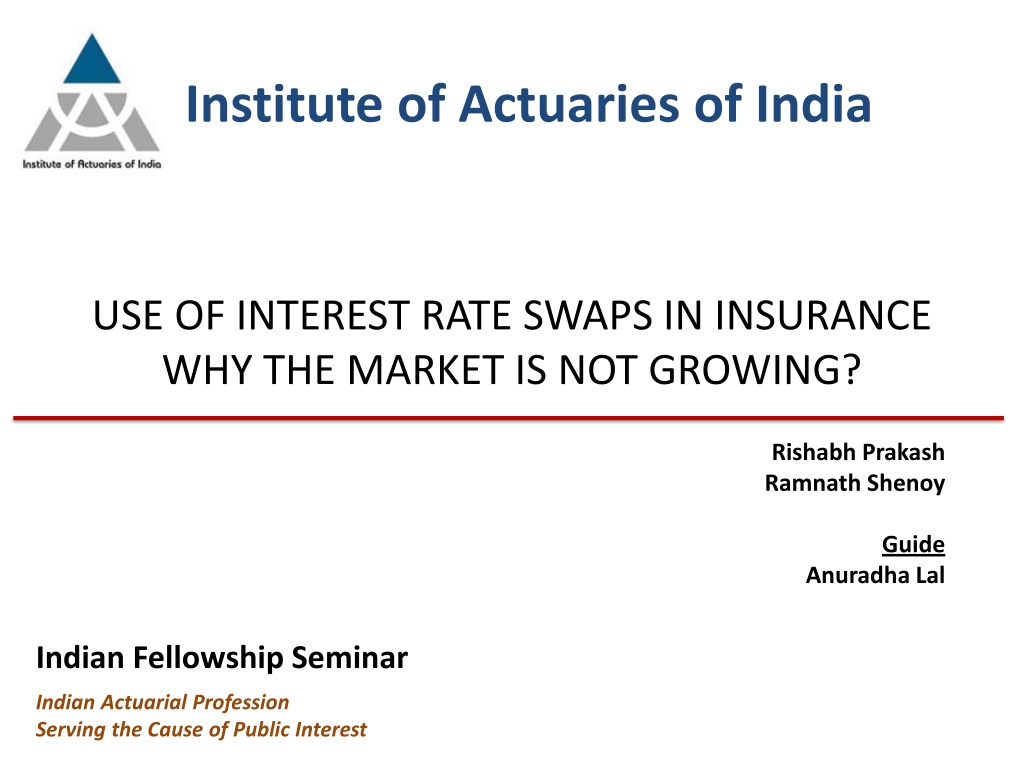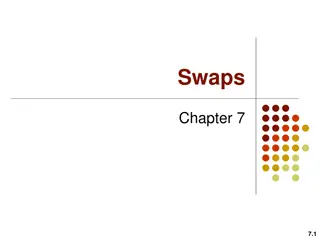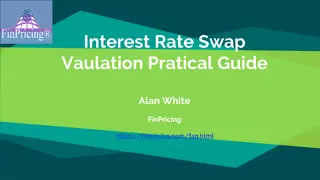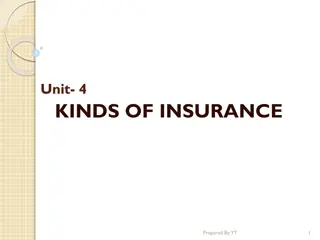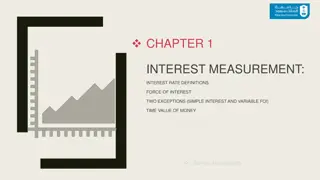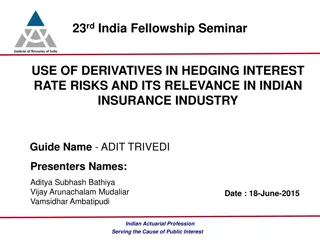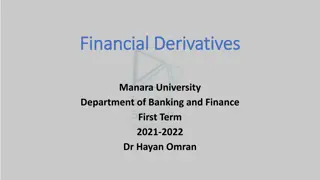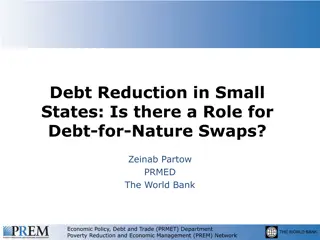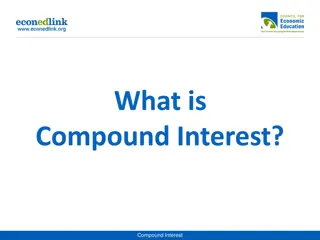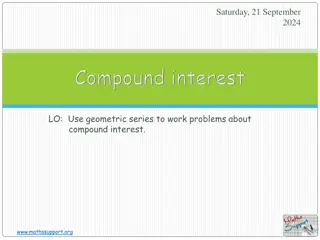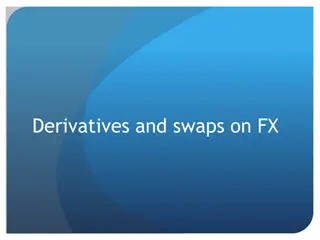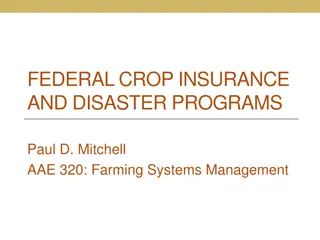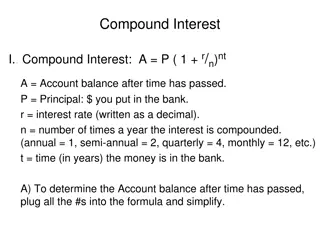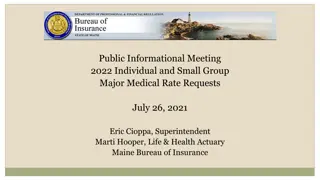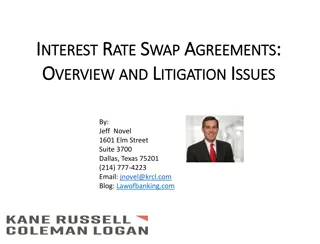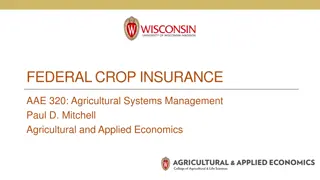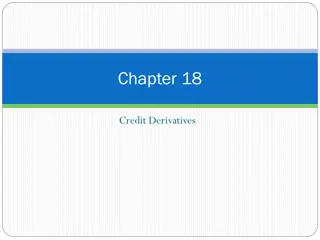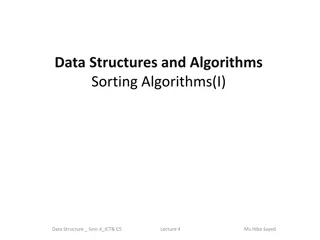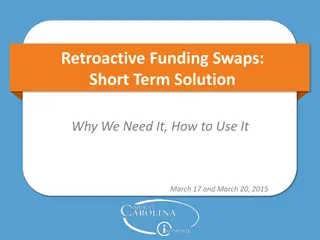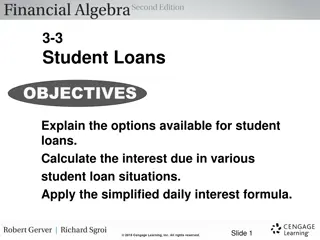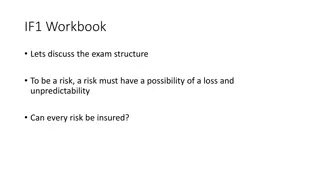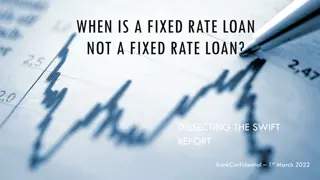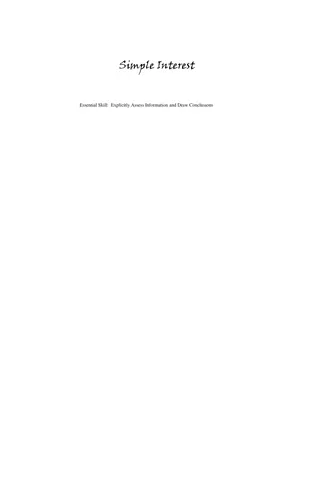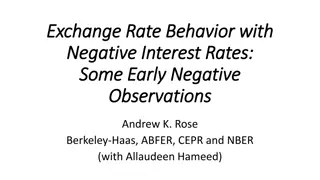Understanding the Use of Interest Rate Swaps in Insurance Industry
This presentation delves into the world of interest rate swaps (IRS), their types, regulations, and market overview in the insurance sector. It explores why the IRS market is not growing despite its potential benefits. The content covers IRS basics, variations in types, regulatory guidelines, and key factors hindering market growth. Valuable insights are shared on how IRS can be utilized effectively in insurance for managing interest rate risks.
Download Presentation

Please find below an Image/Link to download the presentation.
The content on the website is provided AS IS for your information and personal use only. It may not be sold, licensed, or shared on other websites without obtaining consent from the author. Download presentation by click this link. If you encounter any issues during the download, it is possible that the publisher has removed the file from their server.
E N D
Presentation Transcript
Institute of Actuaries of India USE OF INTEREST RATE SWAPS IN INSURANCE WHY THE MARKET IS NOT GROWING? Rishabh Prakash Ramnath Shenoy Guide Anuradha Lal Indian Fellowship Seminar Indian Actuarial Profession Serving the Cause of Public Interest
AGENDA Interest Rate Swaps Overview Interest Rate Swaps Types Interest Rate Swaps Regulation Interest Rate Swaps Use in Insurance Interest Rate Swaps Market Overview Why the market is not growing Take Aways 2
INTEREST RATE SWAP | OVERVIEW What is an IRS? Interest Rate Swap A contract between two parties to exchange a series of two different sets of interest payment Based on a notional principal amount which never gets exchanged Frequency and term of payments are same for both sides of payment Payments made in the same currency 3
INTEREST RATE SWAP | TYPES Variations in the product Plain Vanilla Interest Rate Swap A series of fixed interest payment is exchanged with a series of floating interest payment Zero Coupon Swap Each individual payment under plain vanilla IRS is traded separately Amortising Swap Notional principal reduces in a predetermined way Accreting Swap Notional principal increases in a predetermined way Deferred Swap Swap commences at some future date 4
INTEREST RATE SWAP | REGULATION Highlights of the latest derivative guidelines Allowed Instruments Forward Rate Agreements, Interest Rate Swaps, Exchange traded Interest Rate Futures Derivatives must be used only for hedging purposes, specifically for 1. Reinvestment of maturity proceeds of existing income investments 2. Investment of interest income receivable 3. Expected policy premium income receivable of the underwritten insurance contracts in Life and Pension & Annuity business Allowed Purpose Allowed Counterparties Documentation Commercial Banks and Primary Dealers ISDA and two way CSA 1. Exposure limits applicable as per the IRDA Investment Regulations 2. Exposure limits pertaining to single issuer, group and industry will be applicable 3. No contracts to be entered with promoter group entities directly or indirectly 4. Exposure to derivative instruments with underlying infrastructure instruments shall be treated as exposure to infrastructure sector Exposure Limits Outstanding notional principal amount of the derivative should not exceed 100% of the book value of the fixed income investments (across all funds) Size Cap 5
INTEREST RATE SWAP | USE IN INSURANCE Importance in different lines of business NOT VERY IMPORTANT GENERAL INSURANCE Interest rate risk is small as majority of products are short term NOT VERY IMPORTANT HEALTH INSURANCE Interest rate risk is small as majority of products are short term RETIREMENT BENEFIT IMPORTANT More important for DB than DC due to guarantee VERY ANNUITY Interest rate risk is high due to long term nature. IMPORTANT Discretionary benefits can be used to manage the interest rate risk. However, swaps can still be used to match the guaranteed benefit. PAR USEFUL Can be used to meet the implicit guaranteed rate used in pricing. Very important for products with guarantees, but the size of this line of business is relatively small. LIFE NON PAR TRADITIONAL IMPORTANT INSURANCE Can be used to protect against reinvestment risk in future. However, this would also compromise the upside to the customer. NON PAR VIP USEFUL NOT VERY IMPORTANT On the unit side, interest rate risk is borne by the customer. Non unit is quite small. UNIT LINKED 6
INTEREST RATE SWAP | USE IN INSURANCE To protect against reinvestment risk Swaps can be used to guarantee a fixed income on the portfolio on future premiums and reinvestment of interest income Example of a Par product where the premium income in initial years exceeds the corresponding outgoes Liability net of premium is negative in initial years The strategy can be to hedge the guaranteed benefit and take risk only on the discretionary part of the liability Disclosure requirements in case of a significant change in investment philosophy WITHOUT SWAP - ACCRETING - DEFERRED - PLAIN VANILLA WITH SWAP EXCESS LIABILITY Liab Discretionary CF Liab Discretionary CF EXCESS ASSETS Liab Guaranteed CF Liab Guaranteed CF Asset CF Asset CF 7 Years Years 1 3 4 6 8 9 11 13 14 16 18 19 21 23 24 26 28 29 1 3 4 6 8 9 11 13 14 16 18 19 21 23 24 26 28 29
INTEREST RATE SWAP | USE IN INSURANCE To match assets and liabilities Swaps can be used to match the assets and liability more closely if Bond of long enough term are not available Swap tenor available is higher than bond terms available This can be done by investing in a combination of short term bonds and deferred swaps, giving a combined payoff of a long term fixed bond Example of cash flow matching of annuity - DEFERRED SWAPS WITHOUT SWAPS WITH SWAPS Bond CF Liability CF Difference Bond + Swap CF Liability CF Difference Cash Flow Cash Flow 1 3 5 7 9 11 13 15 17 19 21 23 25 27 29 31 33 35 37 39 41 43 45 47 49 51 53 55 57 59 61 1 3 5 7 9 11 13 15 17 19 21 23 25 27 29 31 33 35 37 39 41 43 45 47 49 51 53 55 57 59 61 Year Year 8
INTEREST RATE SWAP | USE IN INSURANCE To ensure meeting the minimum guaranteed rate The swaps can be used to convert the fixed rate liability into floating rate liability The company pays the floating rate and receives the fixed rate The company can invest its funds and the future receivables (premium and investment income) in cash instruments and earn the floating rate Thus, the company ensures to meet the minimum guaranteed rate Instead of full matching up to the guaranteed rate, it can do partial matching and take risk on the residual amount depending on its risk appetite - DEFERRED -ACCRETING - PLAIN VANILLA MIBOR INVESTMENT BANKER INSURER MIBOR +X bps ASSET FIXED 9
INTEREST RATE SWAP | USE IN INSURANCE Other Uses To change the asset characteristics without deleveraging existing assets To optimize the SCR in the Solvency II calculations To reduce the Cost of Guarantee and enhance value To reduce the balance sheet volatility by hedging against fall in returns 10
INTEREST RATE SWAP | MARKET OVERVIEW The market is illiquid and immature The only fixed income derivative market that trades actively is the OIS market The INBMK market is highly illiquid OIS market is quoted up to 10 year but is liquid only up to 5 year After the 2008 financial crisis, the trading volumes had fallen significantly and have stagnated at the lower levels The OIS and the Gsec rates rarely converge 12.0% G Sec OIS Spread IRS Trading Volumes 10.0% 50,000 Notional Principal (Rs Billions) 8.0% 45,000 40,000 6.0% G Sec - 5 yr 35,000 4.0% 30,000 OIS -5 yr 25,000 INBMK Spread 2.0% 20,000 MIBOR 15,000 0.0% 10,000 2004 2006 2008 2010 2012 2014 -2.0% 5,000 - -4.0% 2007-08 2008-09 2009-10 2010-11 2011-12 2012-13 2013-14 11
WHY MARKET IS NOT GROWING | AVAILABILITY Tough to find a suitable product Term to maturity The OIS market is illiquid for terms after 5 years Hard to find instruments beyond 10 years Although banks would be willing to hedge their floating liability against insurer s fixed liability, banks are looking at short term horizon (3 5 years) while insurer requirements are much longer (15 20 years) In contrast, in a market like UK, swaps are available with duration of 30 - 50 years 12
WHY MARKET IS NOT GROWING | BASIS RISK Residual risk remaining after product discovery Cash investment to pay floating rate The underlying OIS curve is used to determine the swap rates In case the insurer enters into a swap to receive fixed and pay floating, it needs to invest in short term assets to hedge its floating liability If the insurer remains invested in long term G Secs, the spread between OIS curve and G Sec curve can result in losses Even if the insurer invests in short term instruments, there remains a slight spread between the OIS and the money market rates In the event of sale of the asset, winding up may be very costly due to the spread between swap and Gsec rates Amount to be hedged Future premium amount depends on future persistency rates The amount hedged might turn out to be higher / lower than the actual requirement 13
WHY MARKET IS NOT GROWING | COMPLEXITIES - 1 Complex product to manage Board Approval Need for detailed pre approved policy from Board Should cover authorized products, ensure adequate staff resources and establish management responsibilities Infrastructure requirements Investment Management Systems to be prepared to manage derivatives Initial expenses to be incurred in setting systems and processes and staff Risk Management Policy Identification of potential risks, suitable measurement parameters, suitable VaR level, and risk limits Decisions to be discussed in ALCO and IC 14
WHY MARKET IS NOT GROWING | COMPLEXITIES - 2 Complex product to manage Monitoring and rebalancing / regular MIS Board review at least once a year Quarterly report to IRDA Demonstrating that swap is used only for hedging purposes Hedge effectiveness needs to be proved Hedging instrument should cover the risk within 80% 125% ISDA Documentation / CSA Agreement ISDA documentation requirement Need to enter into a two way CSA agreement to reduce Credit risk Can be expensive and time consuming 15
WHY MARKET IS NOT GROWING | COMPLEXITIES - 3 What is an IRS? Credit Exposure Calculation Future Credit exposure based on tenor dependent conversion factors With periodic collateral exchange under CSA agreements, conversion factor of tenor 1 year or less should be used Accounting and Disclosure Accounting as per AS 30 and disclosure as per AS 31 and AS 32 Disclosure on nature and terms of outstanding derivatives and potential losses on counterparty failure Audit Requirements Prior approval from the concurrent auditor about adequacy of systems and processes to handle derivatives 16
WHY MARKET IS NOT GROWING | COUNTERPARTY RISK Risk and Issues in management In case of counterparty default, there might be losses and also the cost of entering into a new hedge Collateralisation requires exchange and investments of collateral on a regular basis Insurer not allowed to borrow funds, acceptance of cash collateral amounts to borrowing In case of using bond collateral, the market value will be volatile Diversification hard to achieve for insurers with the limited swap market 17
WHY MARKET IS NOT GROWING | OTHER ISSUES Who takes the first plunge ? Derivatives can be too risky if not properly used need to convince the Board Natural hedges between different lines of business Indian insurance industry is relatively immature and so product mix can change quickly Effect of new business on interest rate risk For new business, need to enter new contracts on a regular basis Information asymmetry between insurer and banker about each other s needs Too costly in the beginning as no standardized market Swap spread could be volatile causing MTM losses on unwinding BASEL 3 norms for banks effect on bank s risk appetite 18
WHY MARKET IS NOT GROWING | ALTERNATIVES Caps, floors and swaptions provide a more suitable hedge LIMITATION OF SWAP ALTERNATIVE INSTRUMENT It does protect against the loss due to unfavorable movement in the interest rates, but also sacrifices the gain in the case of a favorable movement Swaption, which gives the insurer an option to enter into the swap only if the risk is biting It protects against large as well as small change in interest rate whereas for an insurer, it is only the big changes in the interest rate that is more crucial to be protected against Caps and Floors which protect against a large movement in the interest rate and leave the risk of small interest rate shifts with the insurer 19
INTEREST RATE SWAP | TAKE AWAYS Summary Swaps can be used extensively by insurers to reduce the interest rate risk in its business More important for annuities, non par and retirement products but less useful for the big products ULIPs and Par Supply constraints in the Indian market in terms of volume of trades and the maturity of the swap Complex management makes it even tougher to initiate dealing in swaps Alternative products like caps, floors and swaptions more suited to meet insurer needs 20
Institute of Actuaries of India Questions / Suggestions ? Rishabh Prakash prakash.rishabh@gmail.com Ramnath Shenoy ramnath.shenoy@gmail.com
